![[HorribleSubs]_PSYCHO-PASS_-_06_[720p].mkv_snapshot_06.28_[2012.11.16_23.03.32] [HorribleSubs]_PSYCHO-PASS_-_06_[720p].mkv_snapshot_06.28_[2012.11.16_23.03.32]](https://lh5.ggpht.com/-Qh-TyH-Z2GA/UKZYqlf0LNI/AAAAAAACIQE/bswXrdPHaNo/%25255BHorribleSubs%25255D_PSYCHO-PASS_-_06_%25255B720p%25255D.mkv_snapshot_06.28_%25255B2012.11.16_23.03.32%25255D_thumb.jpg?imgmax=800) |
![[HorribleSubs]_PSYCHO-PASS_-_06_[720p].mkv_snapshot_16.46_[2012.11.16_23.16.09] [HorribleSubs]_PSYCHO-PASS_-_06_[720p].mkv_snapshot_16.46_[2012.11.16_23.16.09]](https://lh3.ggpht.com/-dFlPcfb6lZw/UKZY4crrHoI/AAAAAAACIQU/tGDWrt2CHpQ/%25255BHorribleSubs%25255D_PSYCHO-PASS_-_06_%25255B720p%25255D.mkv_snapshot_16.46_%25255B2012.11.16_23.16.09%25255D_thumb.jpg?imgmax=800) |
![[HorribleSubs]_PSYCHO-PASS_-_06_[720p].mkv_snapshot_20.39_[2012.11.16_23.20.17] [HorribleSubs]_PSYCHO-PASS_-_06_[720p].mkv_snapshot_20.39_[2012.11.16_23.20.17]](https://lh3.ggpht.com/-E5WJV74SHHY/UKZZF3i9sLI/AAAAAAACIQk/-iWYrU7lQss/%25255BHorribleSubs%25255D_PSYCHO-PASS_-_06_%25255B720p%25255D.mkv_snapshot_20.39_%25255B2012.11.16_23.20.17%25255D_thumb.jpg?imgmax=800) |
The world of Psycho-Pass continues to get darker, stranger and more interesting every week.
Considering the somewhat reflective way in which this episode started, it certainly managed to pack an awful lot into its 22 minutes. It ended up being one of the creepiest episodes yet, and also one of the most informative – we learned some interesting things about several members of the main cast, and about the man who appears to be clearing space for himself as the antagonist in the story. I’m not going to call him a villain yet, because this is Urobuchi Gen and there’s plenty of evidence that the system the good guys are fighting to protect may not be worth protecting.
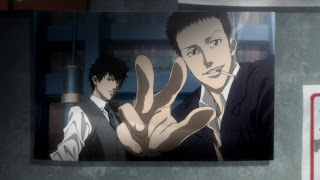 Let’s start with Ginoza, who’s been more or less the dedicated flatus patsy (I don’t know what it means either, but I wanted to use it in a sentence) of the series thus far. What we knew already is that he used to be Kougami’s partner, before the case that sent Kougami’s psycho-pass through the roof and his career track into the ditch. What we didn’t know – and still don’t have the details on – is that he’s been cautioned repeatedly “not to make the same mistake his father did” by Karanomori. Between that and Kougami’s cautionary downfall it’s easier to see why Ginoza is so tentative as a detective, preferring to let the enforcers make the leaps of intuition that solve cases so he can avoid the dark places of the mind. But given what we saw a few episodes ago, Karanomori’s words can’t help but make me wonder what the connection between Masaoka and Ginoza is, and why there’s’ no much tension between them. It’s certainly possible that Ginoza could be Masaoka’s son – it fits both the calendar and the plot – but I haven’t decided yet if that’s someplace Gen would be inclined to go.
Let’s start with Ginoza, who’s been more or less the dedicated flatus patsy (I don’t know what it means either, but I wanted to use it in a sentence) of the series thus far. What we knew already is that he used to be Kougami’s partner, before the case that sent Kougami’s psycho-pass through the roof and his career track into the ditch. What we didn’t know – and still don’t have the details on – is that he’s been cautioned repeatedly “not to make the same mistake his father did” by Karanomori. Between that and Kougami’s cautionary downfall it’s easier to see why Ginoza is so tentative as a detective, preferring to let the enforcers make the leaps of intuition that solve cases so he can avoid the dark places of the mind. But given what we saw a few episodes ago, Karanomori’s words can’t help but make me wonder what the connection between Masaoka and Ginoza is, and why there’s’ no much tension between them. It’s certainly possible that Ginoza could be Masaoka’s son – it fits both the calendar and the plot – but I haven’t decided yet if that’s someplace Gen would be inclined to go.
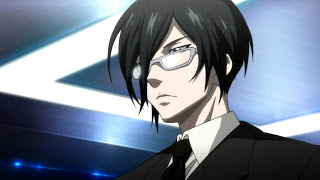 As for Kougami, he remains the dark, simmering presence at the fulcrum of the series. He still has nightmares about the case that led to his downfall, the one he’s still trying to solve three years after the fact. It’s revealing that Kougami was close enough to his enforcers as an investigator that the death of one of them – Sasayama – could have unhinged him so completely. It’s something he can and Akane have in common, though he’s nominally on the other end of the relationship now. As for the case itself, it was a hideous one – bodies dismembered and preserved through plastination, including Sasayama’s, and the murderer was never caught, though the disappearance of a suspect did coincide with the end of the serial killings.
As for Kougami, he remains the dark, simmering presence at the fulcrum of the series. He still has nightmares about the case that led to his downfall, the one he’s still trying to solve three years after the fact. It’s revealing that Kougami was close enough to his enforcers as an investigator that the death of one of them – Sasayama – could have unhinged him so completely. It’s something he can and Akane have in common, though he’s nominally on the other end of the relationship now. As for the case itself, it was a hideous one – bodies dismembered and preserved through plastination, including Sasayama’s, and the murderer was never caught, though the disappearance of a suspect did coincide with the end of the serial killings.
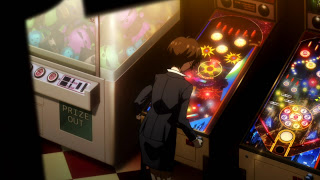 Cue the present, and some very strange goings-on a an all-girls high school. Oryo Rikako (the peerless Sakamoto Maaya, as always fantastic) is a campus Goddess – smart, beautiful, extremely popular. She’s also a serial killer inspired by her favorite Shakespeare play, the gruesome “Titus Andronicus”, especially the fate of Lavinia. But like last week’s perp and the murderous drone worker, Oryo is only the symptom, not the disease – she’s a tool in the hands of Makishima Shougo. Nevertheless the setting and manner of her crimes are especially unsettling, full of that quiet and savage brutality that Urobuchi Gen is so good at capturing. He equates serial murder and beauty so often in his fiction that it’s impossible for me to believe that Gen doesn’t see a sort of beauty in horrible violence himself – at the very least, he’s fascinated by the way it tempts humanity with its siren song, and about what makes most of us able to resist the urge while others cannot.
Cue the present, and some very strange goings-on a an all-girls high school. Oryo Rikako (the peerless Sakamoto Maaya, as always fantastic) is a campus Goddess – smart, beautiful, extremely popular. She’s also a serial killer inspired by her favorite Shakespeare play, the gruesome “Titus Andronicus”, especially the fate of Lavinia. But like last week’s perp and the murderous drone worker, Oryo is only the symptom, not the disease – she’s a tool in the hands of Makishima Shougo. Nevertheless the setting and manner of her crimes are especially unsettling, full of that quiet and savage brutality that Urobuchi Gen is so good at capturing. He equates serial murder and beauty so often in his fiction that it’s impossible for me to believe that Gen doesn’t see a sort of beauty in horrible violence himself – at the very least, he’s fascinated by the way it tempts humanity with its siren song, and about what makes most of us able to resist the urge while others cannot.
The notion of a criminal mastermind who’s modus operandi is to find those with a motive to kill and give them the means to act on it is a very interesting one, and looks to be the hook that will allow Psycho-Pass to find some new trails to blaze in this well-worn territory. The ultimate question is one of motive, of course – what motivates a man to help others kill simply because they want to, and he can? The setting and the nature of the crimes suggest to me that Makishima’s motives may very well be political – he may be a simple psychopath but it doesn’t feel that way now. This is a society where free will is under constant threat from the system that nominally protects it, and this could very well be Makishima’s way of making a statement about the moral and practical bankruptcy of Sybil itself. We heard many times this week about the lack of choice in this world, and Karanomori specifically mentioned (in the context of Ginoza’s father) that there’s no proven link between genetics and latent criminality as Sybil defines it. Each succeeding revelation seems to punch another hole in the rationale that (barely) holds this society together.
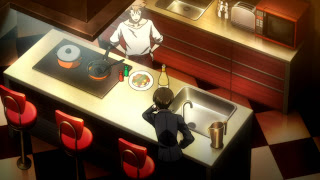 In the context of all this big exposition, there were a lot of nice quiet character moments here too, among them a scene between Akane and the relatively unexplored Kagari. It was interesting to see the two of them engaged in time-wasting behavior in the detectives lounge – she playing pinball and arcade games, he cooking – and in addition to humanizing the characters it also makes the artificial divide between inspector and enforcer seem even more absurd. It’s also apparent that in spite of the fact that few people in this world drink actual booze for fear of addiction (though synthahol is apparently popular) Akane can hold her Montrachet quite well – better than Kagari in fact. She continues to distance herself from the bumbling naïf of the premiere – so much so that it might cross the border into unrealistic, but it’s undeniably more interesting this way. I still see Akane as the wolf in sheep’s clothing, the one who’s sort of fooled the Sybil system already with her faculties escaping categorization. I never would have expected I’d be this close to calling her “formidable” by now, but at the very least she’s full of surprises and not to be trifled with.
In the context of all this big exposition, there were a lot of nice quiet character moments here too, among them a scene between Akane and the relatively unexplored Kagari. It was interesting to see the two of them engaged in time-wasting behavior in the detectives lounge – she playing pinball and arcade games, he cooking – and in addition to humanizing the characters it also makes the artificial divide between inspector and enforcer seem even more absurd. It’s also apparent that in spite of the fact that few people in this world drink actual booze for fear of addiction (though synthahol is apparently popular) Akane can hold her Montrachet quite well – better than Kagari in fact. She continues to distance herself from the bumbling naïf of the premiere – so much so that it might cross the border into unrealistic, but it’s undeniably more interesting this way. I still see Akane as the wolf in sheep’s clothing, the one who’s sort of fooled the Sybil system already with her faculties escaping categorization. I never would have expected I’d be this close to calling her “formidable” by now, but at the very least she’s full of surprises and not to be trifled with.
![[HorribleSubs]_PSYCHO-PASS_-_06_[720p].mkv_snapshot_07.55_[2012.11.16_23.05.25] [HorribleSubs]_PSYCHO-PASS_-_06_[720p].mkv_snapshot_07.55_[2012.11.16_23.05.25]](https://lh4.ggpht.com/-Qw4Fqxqk8ys/UKZZVtoLiLI/AAAAAAACIQ0/OD58fWtzexg/%25255BHorribleSubs%25255D_PSYCHO-PASS_-_06_%25255B720p%25255D.mkv_snapshot_07.55_%25255B2012.11.16_23.05.25%25255D_thumb.jpg?imgmax=800) |
![[HorribleSubs]_PSYCHO-PASS_-_06_[720p].mkv_snapshot_08.42_[2012.11.16_23.06.12] [HorribleSubs]_PSYCHO-PASS_-_06_[720p].mkv_snapshot_08.42_[2012.11.16_23.06.12]](https://lh3.ggpht.com/-Cbs_2e53W2c/UKZZizXxJ0I/AAAAAAACIRE/LAFpzTXzCqY/%25255BHorribleSubs%25255D_PSYCHO-PASS_-_06_%25255B720p%25255D.mkv_snapshot_08.42_%25255B2012.11.16_23.06.12%25255D_thumb.jpg?imgmax=800) |
![[HorribleSubs]_PSYCHO-PASS_-_06_[720p].mkv_snapshot_09.55_[2012.11.16_23.07.25] [HorribleSubs]_PSYCHO-PASS_-_06_[720p].mkv_snapshot_09.55_[2012.11.16_23.07.25]](https://lh5.ggpht.com/-9_Hl7gkOGSs/UKZZvyxr3cI/AAAAAAACIRU/vDzzRTWHsjg/%25255BHorribleSubs%25255D_PSYCHO-PASS_-_06_%25255B720p%25255D.mkv_snapshot_09.55_%25255B2012.11.16_23.07.25%25255D_thumb.jpg?imgmax=800) |
![[HorribleSubs]_PSYCHO-PASS_-_06_[720p].mkv_snapshot_10.05_[2012.11.16_23.09.13] [HorribleSubs]_PSYCHO-PASS_-_06_[720p].mkv_snapshot_10.05_[2012.11.16_23.09.13]](https://lh3.ggpht.com/-V8w-VPkbGp0/UKZZ8-Q98wI/AAAAAAACIRk/ID_QzHwlKZ0/%25255BHorribleSubs%25255D_PSYCHO-PASS_-_06_%25255B720p%25255D.mkv_snapshot_10.05_%25255B2012.11.16_23.09.13%25255D_thumb.jpg?imgmax=800) |
![[HorribleSubs]_PSYCHO-PASS_-_06_[720p].mkv_snapshot_11.50_[2012.11.16_23.11.13] [HorribleSubs]_PSYCHO-PASS_-_06_[720p].mkv_snapshot_11.50_[2012.11.16_23.11.13]](https://lh3.ggpht.com/-yYSGAcnKOnI/UKZaJsGqCyI/AAAAAAACIR0/hBAllOh-3Zc/%25255BHorribleSubs%25255D_PSYCHO-PASS_-_06_%25255B720p%25255D.mkv_snapshot_11.50_%25255B2012.11.16_23.11.13%25255D_thumb.jpg?imgmax=800) |
![[HorribleSubs]_PSYCHO-PASS_-_06_[720p].mkv_snapshot_13.01_[2012.11.16_23.12.24] [HorribleSubs]_PSYCHO-PASS_-_06_[720p].mkv_snapshot_13.01_[2012.11.16_23.12.24]](https://lh6.ggpht.com/-aTitH_dFI3o/UKZaW4HwrrI/AAAAAAACISE/z9_G8iAnGjI/%25255BHorribleSubs%25255D_PSYCHO-PASS_-_06_%25255B720p%25255D.mkv_snapshot_13.01_%25255B2012.11.16_23.12.24%25255D_thumb.jpg?imgmax=800) |
![[HorribleSubs]_PSYCHO-PASS_-_06_[720p].mkv_snapshot_13.06_[2012.11.16_23.12.29] [HorribleSubs]_PSYCHO-PASS_-_06_[720p].mkv_snapshot_13.06_[2012.11.16_23.12.29]](https://lh6.ggpht.com/-2uvT9P4uBrs/UKZajzp8pyI/AAAAAAACISU/MwmMMOkMzbw/%25255BHorribleSubs%25255D_PSYCHO-PASS_-_06_%25255B720p%25255D.mkv_snapshot_13.06_%25255B2012.11.16_23.12.29%25255D_thumb.jpg?imgmax=800) |
![[HorribleSubs]_PSYCHO-PASS_-_06_[720p].mkv_snapshot_13.13_[2012.11.16_23.12.36] [HorribleSubs]_PSYCHO-PASS_-_06_[720p].mkv_snapshot_13.13_[2012.11.16_23.12.36]](https://lh4.ggpht.com/-VXv8XqfMdVI/UKZaxz6et8I/AAAAAAACISk/Qee4rVy-OU8/%25255BHorribleSubs%25255D_PSYCHO-PASS_-_06_%25255B720p%25255D.mkv_snapshot_13.13_%25255B2012.11.16_23.12.36%25255D_thumb.jpg?imgmax=800) |
![[HorribleSubs]_PSYCHO-PASS_-_06_[720p].mkv_snapshot_13.25_[2012.11.16_23.12.47] [HorribleSubs]_PSYCHO-PASS_-_06_[720p].mkv_snapshot_13.25_[2012.11.16_23.12.47]](https://lh3.ggpht.com/-YITqFE3FjVM/UKZa-CQUOQI/AAAAAAACIU4/2Pj1gP8MxLY/%25255BHorribleSubs%25255D_PSYCHO-PASS_-_06_%25255B720p%25255D.mkv_snapshot_13.25_%25255B2012.11.16_23.12.47%25255D_thumb.jpg?imgmax=800) |
![[HorribleSubs]_PSYCHO-PASS_-_06_[720p].mkv_snapshot_15.27_[2012.11.16_23.14.50] [HorribleSubs]_PSYCHO-PASS_-_06_[720p].mkv_snapshot_15.27_[2012.11.16_23.14.50]](https://lh6.ggpht.com/-Mq8EcGlbgBc/UKZbLWXOjwI/AAAAAAACIVI/T9YJVXNX69I/%25255BHorribleSubs%25255D_PSYCHO-PASS_-_06_%25255B720p%25255D.mkv_snapshot_15.27_%25255B2012.11.16_23.14.50%25255D_thumb.jpg?imgmax=800) |
![[HorribleSubs]_PSYCHO-PASS_-_06_[720p].mkv_snapshot_16.12_[2012.11.16_23.15.35] [HorribleSubs]_PSYCHO-PASS_-_06_[720p].mkv_snapshot_16.12_[2012.11.16_23.15.35]](https://lh6.ggpht.com/-f2nvYrbvQSo/UKZbYH-Lh-I/AAAAAAACIVY/jaWkOuaAkMg/%25255BHorribleSubs%25255D_PSYCHO-PASS_-_06_%25255B720p%25255D.mkv_snapshot_16.12_%25255B2012.11.16_23.15.35%25255D_thumb.jpg?imgmax=800) |
![[HorribleSubs]_PSYCHO-PASS_-_06_[720p].mkv_snapshot_18.16_[2012.11.16_23.17.39] [HorribleSubs]_PSYCHO-PASS_-_06_[720p].mkv_snapshot_18.16_[2012.11.16_23.17.39]](https://lh3.ggpht.com/-JyOZSqe1_VY/UKZbnKSwzuI/AAAAAAACIVo/olliKvUCleA/%25255BHorribleSubs%25255D_PSYCHO-PASS_-_06_%25255B720p%25255D.mkv_snapshot_18.16_%25255B2012.11.16_23.17.39%25255D_thumb.jpg?imgmax=800) |
![[HorribleSubs]_PSYCHO-PASS_-_06_[720p].mkv_snapshot_18.28_[2012.11.16_23.17.51] [HorribleSubs]_PSYCHO-PASS_-_06_[720p].mkv_snapshot_18.28_[2012.11.16_23.17.51]](https://lh5.ggpht.com/-VWe3H0vqMOM/UKZbz2nbE4I/AAAAAAACIV4/YomxXImjydQ/%25255BHorribleSubs%25255D_PSYCHO-PASS_-_06_%25255B720p%25255D.mkv_snapshot_18.28_%25255B2012.11.16_23.17.51%25255D_thumb.jpg?imgmax=800) |
![[HorribleSubs]_PSYCHO-PASS_-_06_[720p].mkv_snapshot_19.00_[2012.11.16_23.18.23] [HorribleSubs]_PSYCHO-PASS_-_06_[720p].mkv_snapshot_19.00_[2012.11.16_23.18.23]](https://lh6.ggpht.com/-X60bmIp74O4/UKZcAdrCY1I/AAAAAAACIWI/10k95WfPnEs/%25255BHorribleSubs%25255D_PSYCHO-PASS_-_06_%25255B720p%25255D.mkv_snapshot_19.00_%25255B2012.11.16_23.18.23%25255D_thumb.jpg?imgmax=800) |
![[HorribleSubs]_PSYCHO-PASS_-_06_[720p].mkv_snapshot_19.37_[2012.11.16_23.18.59] [HorribleSubs]_PSYCHO-PASS_-_06_[720p].mkv_snapshot_19.37_[2012.11.16_23.18.59]](https://lh5.ggpht.com/-E74ZVsFRNzI/UKZcOBB-5wI/AAAAAAACIWY/RT5hjv70ZeM/%25255BHorribleSubs%25255D_PSYCHO-PASS_-_06_%25255B720p%25255D.mkv_snapshot_19.37_%25255B2012.11.16_23.18.59%25255D_thumb.jpg?imgmax=800) |
![[HorribleSubs]_PSYCHO-PASS_-_06_[720p].mkv_snapshot_20.00_[2012.11.16_23.19.23] [HorribleSubs]_PSYCHO-PASS_-_06_[720p].mkv_snapshot_20.00_[2012.11.16_23.19.23]](https://lh5.ggpht.com/-K2MoooSUWlo/UKZcbVpte-I/AAAAAAACIWo/XUdprw5F-A0/%25255BHorribleSubs%25255D_PSYCHO-PASS_-_06_%25255B720p%25255D.mkv_snapshot_20.00_%25255B2012.11.16_23.19.23%25255D_thumb.jpg?imgmax=800) |
![[HorribleSubs]_PSYCHO-PASS_-_06_[720p].mkv_snapshot_20.05_[2012.11.16_23.19.28] [HorribleSubs]_PSYCHO-PASS_-_06_[720p].mkv_snapshot_20.05_[2012.11.16_23.19.28]](https://lh6.ggpht.com/-A4-j_-SPpjo/UKZcp1qk02I/AAAAAAACIW4/YhQF7eMHl98/%25255BHorribleSubs%25255D_PSYCHO-PASS_-_06_%25255B720p%25255D.mkv_snapshot_20.05_%25255B2012.11.16_23.19.28%25255D_thumb.jpg?imgmax=800) |
![[HorribleSubs]_PSYCHO-PASS_-_06_[720p].mkv_snapshot_20.26_[2012.11.16_23.19.49] [HorribleSubs]_PSYCHO-PASS_-_06_[720p].mkv_snapshot_20.26_[2012.11.16_23.19.49]](https://lh6.ggpht.com/-X-iuGusMWf4/UKZc8r1JObI/AAAAAAACIXI/5QgjVaYLoUE/%25255BHorribleSubs%25255D_PSYCHO-PASS_-_06_%25255B720p%25255D.mkv_snapshot_20.26_%25255B2012.11.16_23.19.49%25255D_thumb.jpg?imgmax=800) |
![[HorribleSubs]_PSYCHO-PASS_-_06_[720p].mkv_snapshot_20.30_[2012.11.16_23.20.08] [HorribleSubs]_PSYCHO-PASS_-_06_[720p].mkv_snapshot_20.30_[2012.11.16_23.20.08]](https://lh5.ggpht.com/-8JB-ZWRsOw0/UKZdOIhe5FI/AAAAAAACIXY/IvhdHcws0Ic/%25255BHorribleSubs%25255D_PSYCHO-PASS_-_06_%25255B720p%25255D.mkv_snapshot_20.30_%25255B2012.11.16_23.20.08%25255D_thumb.jpg?imgmax=800) |
![[HorribleSubs]_PSYCHO-PASS_-_06_[720p].mkv_snapshot_20.37_[2012.11.16_23.20.15] [HorribleSubs]_PSYCHO-PASS_-_06_[720p].mkv_snapshot_20.37_[2012.11.16_23.20.15]](https://lh4.ggpht.com/-tuPIpEnbQOk/UKZdhhrnQOI/AAAAAAACIXo/u8_FL9g31sk/%25255BHorribleSubs%25255D_PSYCHO-PASS_-_06_%25255B720p%25255D.mkv_snapshot_20.37_%25255B2012.11.16_23.20.15%25255D_thumb.jpg?imgmax=800) |
![[HorribleSubs]_PSYCHO-PASS_-_06_[720p].mkv_snapshot_21.25_[2012.11.16_23.21.03] [HorribleSubs]_PSYCHO-PASS_-_06_[720p].mkv_snapshot_21.25_[2012.11.16_23.21.03]](https://lh3.ggpht.com/-bAvjz6sUF-s/UKZdtxtRINI/AAAAAAACIX4/nhtv2TBNvKU/%25255BHorribleSubs%25255D_PSYCHO-PASS_-_06_%25255B720p%25255D.mkv_snapshot_21.25_%25255B2012.11.16_23.21.03%25255D_thumb.jpg?imgmax=800) |


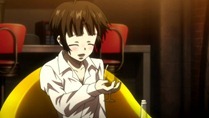
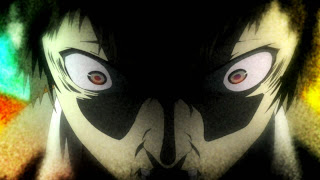
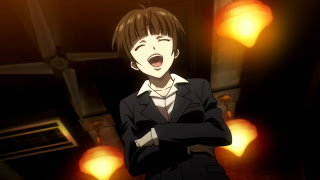


Kim
November 16, 2012 at 4:31 pmI didn't even think that Masaoka might be Ginoza's father. But I can definitely see it now that you mention it.
elianthos
November 16, 2012 at 6:01 pm'flatus patsy (I don’t know what it means either, but I wanted to use it in a sentence)' will intuition of the full meaning of such pun ever dawn on us I wonder. Because really, it's breaking my brain.
About Masaoka being Gino's father… oh hey, I thought about that but that may be too simple of a reveal while a handful to manage implications-wise. I have watched only Madoka before this, so I can't really say how much of this development would fall into Urobuchi's range.
On the other hand, the actual in-story clues about Kogami and Akane keep piling up in this episode as well. I wouldn't really say she's a wolf in sheep's clothing though, at least not more than everybody else.
Well, I'm mostly a follower of the 'humans can be anything and hold infinite potential' belief.
She has never been tested to her limits before I think, her work environment is stimulating her growth and in doing so both revealing and shaping some facets of her character. And she lacks the caution and brakes Ginoza has imposed on himself – actually I'm more worried for Ginoza to crack at some point, as I don't know of he would able to adjust or 'recover' – so whatever things happen, whatever the change, she is more likely to embrace it and readjust with the flow.
On the other hand, Miss HighSchool Popular is already howling in spite of the controlled environment (and I wonder if Makishima is the teacher the pony-tailed girl was mentioning at lunch time before being interrupted by Oryo, in relation to their scholl troubles under the rug… this in turns makes me wonder about any correlation with the plasticine case only known culprit being an highschooler).
—-
'Makishima’s way of making a statement about the moral and practical bankruptcy of Sybil itself. ' That seems the most sensible reading atm.
elianthos
November 16, 2012 at 6:05 pmPart II – seems I broke the max character limit –
—
'He equates serial murder and beauty so often in his fiction that it’s impossible for me to believe that Gen doesn't see a sort of beauty in horrible violence himself – at the very least, he’s fascinated by the way it tempts humanity with its siren song, and about what makes most of us able to resist the urge while others cannot.'
Now, one little notation from an artist on the beauty and cruelty nexus if you don't mind – and insider's POV if you prefer – : dissecting reality and capturing the moment – freeing it from the flow of time in a way – are part of artistic training and motivation. Michelangelo and Da Vinci, in true Renaissance fashion, would study on corpses and sectioning animals and humans themselves, literally elbow-deep in blood guts and decay. Rationally, this is a mean to an end, the latter turning into an harmony of paint, lines, stone.
And even if dissection practices have survived only in medical schools basically, as part of your artistic training you're still required nowadays to analyze and feel the structure of bones, tendons, muscles, what's beneath the skin. In a word, dissect. Dismember. Invade. Soak in. You do it in practice on plasters and molds and clay. You do it mentally when observing a living body, to the point it becomes a second nature. For someone this is a scary attitude to have, both on the starting and receiving end of it. For me it's beautiful. I couldn't render the reality I love so much without acknowledging what lies beneath and analyzing it.
It's a thin line between going through this attitude as the basis for creation and blurring the lines between the means and the end though: for me the end is to capture, preserve and share in an artistic form that certain something my model – situation, creature, feeling – has. This imply my dismembering process is all in the mind and a men to my artwork, the model keeps living – long and healthy preferably – , if anything because it/he/she can offer me more chances of inspiration that way ;p.
From a certain angle, art is cruel and artists are legalized sadists (plus scopophilia, baby). Or simply imbalanced freaks, at best quirky fellows.
Again, is a thin line to walk on, and for someone is an easy one to cross when beauty and violence can be so tightly interwoven and the former blend into the latter.
All of this rambling (and I've cut away all the philosophical quotes already, whew) to bring me back on track with Psycho-Pass to say: I really, really wish to see more of Masaoka's painting subjects.
Oryo herself is quite a talented artist as we could glimpse from her drawings. Her embalming 'sculpture' of that poor kohai of hers is not too far from certain installations by contemporary artist IRL, and again in-universe the plasticine murders could pass for art…
elianthos
November 16, 2012 at 6:49 pmEDIT: plastination murders, not plasticine. Still thinking in terms of fine arts supplies, ahah. Yet, some artworks are made by plastination. They're corpses up for show. The tools and means have become the end already…
Anonymous
December 7, 2012 at 2:12 pmwell… leaving this link here.
http://news.bbc.co.uk/2/hi/uk_news/68877.stm
Google's results and timing work in mysterious ways.
Anonymous
November 16, 2012 at 10:19 pmThe way those body parts are arranged, doesn't it look way too similar to the police logo?
http://24.media.tumblr.com/tumblr_mdl1p41P9o1qby9cgo2_1280.jpg
elianthos
November 16, 2012 at 11:23 pmThey do. I'm tempted to think Makishima had a hand in suggesting the arrangement to the young lady, even if subliminally. It'd make for a perfect statement against the system and a code message laser-targeted at the police squad, at Kougami in particular.
Helen
November 17, 2012 at 1:44 amI'm wondering if something is up with Akane as well. She is smart, I remember in the first episode Masako (or Gino, forget which) asked her if she knew something, she said yes, and then they explained anyway, she's been book smart at least from the beginning and she did do her final studies on the Sibil system. Apparently her Pscyho-Pass rarely gets cloudly, her can hold her alcohol, hell she was snarking a little bit in the beginning of the episode, I'm wondering if we'll get any big revelations about her later on. Not as in "oh she's actually a robot/sent to infiltrate the police" kind of way but there is something intriguing about a system that chooses the people to manage it and Akane was the best of the best choice, I almost wonder if the system wants her to do something to it.
KoroshiyaKi
November 17, 2012 at 9:15 amHum… Modern science begs to differ on the genetic predisposition not being proven.
http://www.youtube.com/watch?v=rc6kk3cT8kM